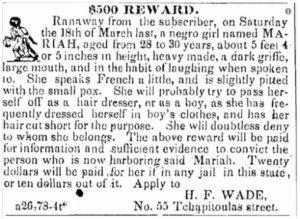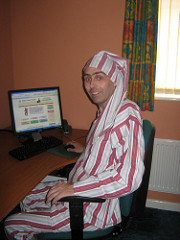 The Freedom on the Move (FOTM) public database project at Cornell University is a major digital database effort to bring together North American fugitive slave advertisements in newspapers from regional, state, and other collections – and online volunteers will be invited to add data tags to the screened entries and to transcribe the ads. This online public engagement by FOTM will allow database users to examine spatial patterns and compare trends over time.
The Freedom on the Move (FOTM) public database project at Cornell University is a major digital database effort to bring together North American fugitive slave advertisements in newspapers from regional, state, and other collections – and online volunteers will be invited to add data tags to the screened entries and to transcribe the ads. This online public engagement by FOTM will allow database users to examine spatial patterns and compare trends over time.
“Ironically, in trying to retrieve their property — the people they claimed as things — enslavers left us mounds of evidence about the humanity of the people they bought and sold,” said Dr. Mary Niall Mitchell, professor of early American history at the University of New Orleans and one of the three lead historians on FOTM.
Mitchell explained. “At what time of year were enslaved people most likely to run? What places did they frequent? What skills did they have? How many could read and write? Or were likely to ‘pass’ for white, or claim to be free? What did they wear? Where were they suspected to be hiding and with whom? Under what circumstances did women run away?”
FOTM received funding from the National Endowment for the Humanities (NEH) digital humanities grants.
Here is an excellent article on about the database, from which I took Dr. Mitchell’s quotes.
Anyway, I gave it a try. I transcribed one ad. I would have liked to have done more, but I kept getting an error message on final submission, so I wasn’t sure if my attempt was even received. I’m wondering if I’m going to receive any sort of update or email from the project, if there is going to be any effort to keep me in the loop about the project and encourage me to transcribe more ads, if there will be any effort to survey me about my experience, or if there will be any solicitations for funding.
I’m also still thinking about that young woman I read about, who had fled someone in South Carolina and was suspected of being harbored by her enslaved mother somewhere… she’s a real person to me now. I hope she was never captured. I hope she got away. I hope she got to reach some dreams. I hope she was happy. Are other volunteers similarly connecting with the information the are transcribing on a human level?
 A shame organizers aren’t calling this a virtual volunteering initiative – because it is! Instead, they use the term “crowdsourcing.” It’s also a micro-volunteering initiative. I hope at least the organizers of this initiative will consider reading The LAST Virtual Volunteering Guidebook. The book, which I co-wrote with Susan Ellis, has lots of detailed suggestions and specifics about virtual volunteering, including task and role development, suggestions on support and supervision of online volunteers, guidelines for evaluating virtual volunteering activities, suggestions for risk management, online safety, ensuring client and volunteer confidentiality and setting boundaries for relationships in virtual volunteering, and much more. The LAST Virtual Volunteering Guidebook is available both as a traditional printed book and as a digital book.
A shame organizers aren’t calling this a virtual volunteering initiative – because it is! Instead, they use the term “crowdsourcing.” It’s also a micro-volunteering initiative. I hope at least the organizers of this initiative will consider reading The LAST Virtual Volunteering Guidebook. The book, which I co-wrote with Susan Ellis, has lots of detailed suggestions and specifics about virtual volunteering, including task and role development, suggestions on support and supervision of online volunteers, guidelines for evaluating virtual volunteering activities, suggestions for risk management, online safety, ensuring client and volunteer confidentiality and setting boundaries for relationships in virtual volunteering, and much more. The LAST Virtual Volunteering Guidebook is available both as a traditional printed book and as a digital book.

